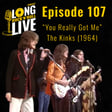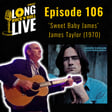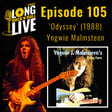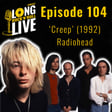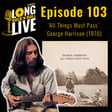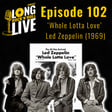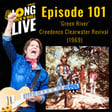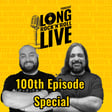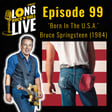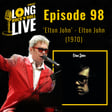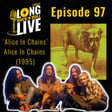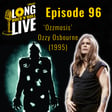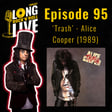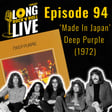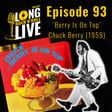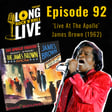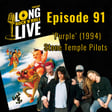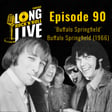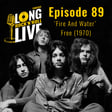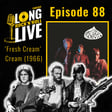Become a Creator today!Start creating today - Share your story with the world!
Start for free
00:00:00
00:00:01

78. 'Face Value' - Phil Collins (1981(
In the wake of a 1978 Genesis World Tour, Phil Collins found himself alone and without his family - having been left by his then-wife who took their two children to Canada. Amidst the heartache and the uncertainty, Collins wrote and executed one of the most honest and emotional pop albums of the 80s. ‘Face Value’ utilises great production, genre-blending and emotional lyrics to portray Phil Collin’s feelings of the time - and what we got was one of the most introspective and heartfelt pop albums of the 80s that set a lyrical and musical standard for generations to come.
Episode Playlist: https://open.spotify.com/playlist/40RxSaKqRyitFdDH5j02vm?si=71b2264765de4096
#PhilCollins #Genesis #FaceValue #InTheAirTonight #IMissedAgain #PopRock #Pop
Transcript
Introduction and Phil Collins' Emotional Journey
00:00:12
Speaker
Hello and welcome back to the Long Live Rock and Roll Podcast. In the wake of a 1978 Genesis World Tour, Phil Collins found himself alone and without his family, having been left by his then wife who took their two children to Canada. Amidst the heartache and then the uncertainty, Collins wrote and executed one of the most honest and emotional pop albums of the 80s. Face Value utilises great production, genre blending and emotional lyrics to portray Phil Collins' feelings of the time. And what we got was one of the most introspective and heartfelt pop albums of the 80s that set a lyrical and musical standard for generations to come.
Hosts' Greetings and Personal Updates
00:00:49
Speaker
Joining me to discuss this album is my co-host, Mr Felipe Amorim. How you doing, bro? Doing great, man. And you?
00:00:55
Speaker
Good. Yeah, very well. Thank you very well. Have things with you. We're good. Yeah, we're enjoying the summer that finally feels like summer. Yeah. Well, it feels like summer because it's consistent. And what's consistent is that we get two days of heat a week and that's it. but but The rest is the rain, isn't it? So it' at least it's consistent through June, through to August. It looks like we're going to get about two days of sun a week. ah But yeah, anyway, guys, welcome back to the show. little terms and conditions that we like to throw in at the start.
Introduction to 'Face Value' and Its Iconic Status
00:01:22
Speaker
Please do us a favour and if you're watching on YouTube, like and subscribe to stay up to date with the with our content and also to get our videos shown to more people. And if you're listening to us on Apple, Spotify or Amazon, do us a favour, go down, do us a quick review so that we get sent out the charts. We sort of ascend through the algorithms and algorithms and we get shown to the right people.
00:01:41
Speaker
Um, so as you heard, this is an album episode and we are doing face value by Phil Collins released in 1981. So I'll go through some quick facts for you. Um, see, I released in February of 1981 recorded between August and December, 1980 at the townhouse in London, the old Croft in Surrey and the village recorder in Los Angeles. Now genres associated with the album would be pop rock, some R and&B, art rock and even blue eyed soul. The length of the album is just under 48 minutes and it was released on the Virgin label with Phil Collins himself and Hugh Padget producing. So time to talk about the album. um I think I chose this one, didn't I? Because um this is just one of those that I've always heard about.
00:02:24
Speaker
always everyone said, oh, it's one of those you got to listen to. You know, it's one of those 80s albums that is always a must listen to. um And so that's why I chose it. So do you want to kick off, bro? Are there any thoughts? you yeah well that Well, this is definitely an album that changed the game for pop music, isn't it? So we from time to time, we talk about pop music here instead of rock music, isn't it? And ah this, for me, is a pop masterpiece brought to life by a prog rock master. i'm um' um'm I'm curious, you said the word masterpiece, do do you really, are you going by what everyone, so you believe it is? Yeah it is. Let's start there, tell me why, why is it not? The sounds andar and and what you said at the beginning, um when you're blending different genres, right, sometimes in pop music people are really afraid of ah experimenting with anything, because like yeah
00:03:16
Speaker
ah The whole premisecy ah premise of of ah pop music is to do something that is going to be commercially viable, right? That's that's pop music in a nutshell. Here's one one interesting thing about this album. There's not a single fast song in the album. true Think
Background on Genesis and Collins' Transition to Solo Work
00:03:32
Speaker
about it. Yeah, there are some funky songs, but not fast. Funky, but no, the BPMs are really slow, all of it, most of it. Mid tempo or slow tempo. There's two instrumental tracks. that blend into each other with on some weird choir like ah melodies but no lyrics and loads and loads of percussion like world music stuff like loads percussion from different styles and genres and and you have the mix of um acoustic drums and percussion with
00:04:04
Speaker
electronic beats, which I mean, he was one of the first songwriters to do it properly. So I think it's quite love a lot of um um experiment for for an album that is such a commercial success. you know and And you can hear the elements of prob music and and the way he arranges stuff and the way he writes. And also like there was something about, ah you've got to consider that I believe that Phil Collins didn't want to prove himself as a solo artist. I don't think he needed to think he proved himself as one of the best prog rock drummers in history and he's also really good at jazz drumming as well but that's another story and he proved that he could take the lead
00:04:53
Speaker
as the singer in the band and replace Peter Gabriel, that's not an easy task. And he did a phenomenal job. and That's what happened yeah with
Emotional State and Creative Process
00:05:02
Speaker
Genesis. yeah let's I'll give a bit of background to the album. um So ah eight years they were in Genesis together, weren't they? peter Gabriel sang for the first five years, but then um but then Phil Collins came in. And he did the singing after Peter Gabriel left. Now I'm not well versed on Genesis. He didn't he didn't yet he didn't want to be a singer in the band. He wanted to be the drummer, but like the the lead singer left, you can sing. So go and do the job and say, all right, I'll do it. yeah And he's like you're not replacing yeah it just like any normal singers, Peter Gabriel. Something really interesting is that you said um you didn't think he fancied doing a solo album himself.
00:05:41
Speaker
and so Something I was reading about is actually the other members of Genesis, Tony Banks and Mike Rutherford, at the same time Phil Collins was writing Face Value, they were writing solo albums as well. yeah thanks Do you think there was a little bit of a inner competition? not not Not competition necessarily, but a little bit of Phil Collins thinking, well, the rest of the band are writing solo albums, I've got to do something. Well, yeah, I think it was ah maybe forced into into a break. I mean, apparently the reason for his divorce is he was never home, always touring and doing stuff. So he actually wanted to keep working. That was that was his
00:06:15
Speaker
normal ah kind of mindset. And and um the other guys are doing the solo stuff and he's been through a divorce, he's on his own, no band, no family, so might as well just do some work. I think that's that's what he thought. And I think he wanted to just express himself Um using the ideas he couldn't use as a band member, you know. Yeah. where like something else yeah an idea I don't actually believe he imagined that would be one of the most iconic pop albums of all time. I think he just wanted to do it for himself. ah Maybe that's why it's so good. And there's something about the drum sound. There's a cool interview. I'll send you the link. And then and and as you guys know, everything we mentioned here, the links are going to be at the description of the episode. See, I'm getting good at this. well done of you and there's an seventy eight episodes like circle
00:07:08
Speaker
ah there's ah There's an interesting thing. um Everyone talks about the sounds and especially the drums in the album. and So he did the pre-production, most of it in his bedroom with an eight-track tape
Innovative Music Production and Techniques
00:07:20
Speaker
machine. So he's just like going through ideas and recording demos, doing his pre-production. on his own, playing keyboards and drums and singing. And then when he went to record the drums for India Tonight, he went to that studio. Is it the Town House studio in London? You've mentioned the name of the studio. Yes, the townhouse in London. where Yeah, where he previously recorded drums for a Peter Gabriel solo album. So he did he did some drumming for Peter Gabriel in his solo album. And first solo album, I guess, on second. And then he he wanted to go to that shit because they had a stone wall behind the drum kit. And that's not that's not the usual kind of stuff. And it's so it's just a weird sound and it's massive. It's that huge drum sound.
00:08:03
Speaker
and it said I want this sound in my album so it's not like what people doing pop music say I don't care like I'm doing this for myself so that's rock and roll right it's like I just I want this sound I want the drum sound like this and I think he was kind of apparently was sound checking or or trying stuff and he did that iconic fill for India tonight and and the engineer was like yeah oh that's that a cool one isn't it yeah I'll keep it and put in the song that was it let's let's talk about production then because you've kind of linked it really well now one one thing that actually stands out about this album and we've said you know musically
00:08:35
Speaker
Lyrically, we're going to touch on a bit later, but musically, this does stand as a very, um, I wouldn't necessarily say innovative album, but well, maybe it is innovative. But anyway, production is a massive part of that because there was something, and this is, I did a bit of reading on it called gated reverb. And this is what ah Phil Collins applied to the drums of this album that hadn't been done before. And it went on to influence many, many, I mean, most of the pop music in the eighties, to be honest. What's your take as a drummer on the drum sound he's achieved? How did he achieve it? Why did he go for it? Does it work? How does it work?
00:09:11
Speaker
I think the the I normally joke that the snare sound of the 80s, the snare drum sound from the 80s, we can still hear the reverb today. The first snare that was played in the 80s, we can still hear the reverb. People overdid that kind of stuff. and But most of the drumming on that time is way too metronomic. And it's like there's a formula to pop music. You got to stick to that particular groove and play in the same way and have that same boring snare sound all over. Like what it does with... I've got to talk about in India air Tonight first, because it's where the first kind of drum sound comes in the album. You have those electronic loops and it builds up and that the song is getting more and more tense. And then you hear that massive drum fill that everyone knows and has been in TV adverts and movies and all this stuff.
00:10:04
Speaker
ah When that comes in, you can hear the reverb, you can hear the natural reverb of the room. That is the thing. it's not only So that's what I'm saying. He was really good at mixing the ah you know all the technological ah possibilities of the time with the actual drumming and the actual acoustic sound. So as you normally have the predictable grooves in pop music, the way he plays, in this album particularly, there's a lot of, it sounds to me, there's a little bit of like African percussion and reggae in some stuff, but there's loads and loads of Motown.
00:10:40
Speaker
Yeah. Loads of Motown vibes in it. And he grew up listening to R and&B and Soul and Motown. And I think his playing is more organic. I kind of, I don't like using this word because everyone uses it as well, but it is organic playing. It's not very metronomic. It's not boring. It's not repetitive. It's not machine-like, but the machines are there to help. Yeah. It's all of it. so so just so can you let me just explain so i wanna i wanna just go on this point about the gated reverb because it's quite important yeah so gated reverb it creates a powerful sharp drum sound by cutting off the reverb reverb abruptly so if you hit a snare and there's lots of reverb on it you're gonna get
Influences and Genre Fusion
00:11:20
Speaker
a
00:11:23
Speaker
yeah if if I don't know if my mic picked that up, but you have a little echo going on there. There'll be a little delay. Now, what this does is it cuts off the reverb before it allows itself to delay it a bit. So, that well, does this do to a drum sound for you? I know you're not like major production, but... i'm not Yeah, I'm not really into this side of of the recording. I think in this case, what you can hear is like you don't have the echo like as a delay thing and you have the reverb itself. It hits you so straight away, doesn't it? Yeah, exactly. And you have that massive, that big sound coming straight to your ears without being cut in... in yeah What can I say? It's not like a series of sounds is one big sound coming straight to your face. yeah And he says that about the production. He said he wanted, he actually mentioned the the Alien movie where the alien just goes like and ah attaches itself to someone's face. Like that I said, I wanted the drum sound to feel like that.
00:12:16
Speaker
in your face, it's like glued to your face, you can't get rid of it. It's a shock when it comes in, isn't it? It is, it is. And you're not expecting it's like almost at the end of the songs, just after the, you know, after you get past half of the song, first half of the song, and you're thinking like, okay, nothing's going to happen in the song anymore, and that kicks in. Another thing about that song specifically is, there's no symbols in that song. It's drum loop. Oh yeah. And everything, the groove he plays from the second half onwards is kick and snare only. And the fills played on the toms all the time, he doesn't use cymbals. So it's kind of tribal, isn't it? yeah Every time there's no cymbals, it feels more like, you know. ah let's Let's talk about that because I love you, you mentioned it, and the African and the percussion, the sounds we got there. Now the song, um we haven't got a little segment at the end to talk about our favorites, but I will just tell you handin hand in hand, it's probably my favorite of the album.
00:13:12
Speaker
I thought that was just stunning. As usual guys, if if if we mention any songs, so you're going to see the playlist for this episode in the show notes, you just click it and it will take you to the Spotify where every song of this album um plus any other we mention will be put there so you guys can have a listen to along with it. Now this reminded me of a song by Marcus Miller called We Were There, so that will be in the playlist as well and it's just
00:13:38
Speaker
I tell you, when when I heard this album, when I heard elements of it, including hand in hand, what was the other one? Drowned. Even things like... um Even some of the the funkier ones, things like, you know, I Missed Again. I thought about Graceland by Paul Simon. wow because Because Paul Simon and Graceland has that obvious foreign influence on Western pop music. yeah It's Paul Simon writing traditional Western music in the sense of structures, normal chord progressions, but he's used African instruments and he was so heavy to do that in 1986. It's just interesting. sorry thomas doesnt here Yeah, I want to point to this. like Back and and in in the day,
00:14:24
Speaker
ah when it wasn't that easy to just go on Google and find anything you wanted to. um Western musicians and songwriters used to to say, you know, world music, every time they're referring to anything that is not European or or American, isn't it? It's like you're isolated in your own culture and you kind of dominate the world in in ah so in in a cultural way with your music. And then you start hearing stuff and it as I said, it's just is just foreign, whatever that is, you know, yeah It's from another country. It's African, or it's Jamaican, or it's Brazilian, whatever. And you try to mix it in. But the cool thing about it, in my opinion, is like, when you don't know enough about those genres, you're going to mix them with your music.
00:15:07
Speaker
in a really kind of firm ah original way. yeah in a original because you don't know yeah yeah it's an innocent way might You might use an instrument the way it's not meant to be used but you might still actually achieve what you want. And you're going to take rhythms and and and chords and melodies that don't necessarily ah belong to western music but when he blends with the music he just works and I think he was really good at that ah using that using the percussion and the choirs as well there's some children's choirs in a few songs yeah no you're right and I think that yeah that's a really nice addition to it and definitely another lovely layer and texture but the whole album has this it it's really interesting because when I was listening to it
00:15:51
Speaker
I couldn't ever really put my finger on a particular genre. Now, you listen to the first song and you think, well, it's kind of rock. And then the second song comes in and you're like, well, hold on, this isn't rock. This is kind of singer-songwriter-y. Then you go to the third song, which is upbeat and funky. And you're like, well, this is pop. it's just All this kind of, all these little styles flying around. But we got lost. I already mentioned, you know, the prog rock stuff. Now, this is not a prog rock album at all. And the only reason we're mentioning prog rock is because Phil Collins has been in Genesis. But I think it's so obvious that this was written by someone who's done prog rock.
00:16:25
Speaker
Yes, there's so much attention to detail. Yes, they did, yeah, behind the lines. Yeah, exactly. But he did it in in a kind of an old town vibe, isn't it? Yeah. He said theres something, you know, that song, um I Want You Back by the Jackson Five. Yeah. ah his His version of of the Behind the Lines it reminds me of that song, look i think i to and apparently he was listening to to his pet version of like someone sped up a tape of Behind the Lines, the Genesis version, and he was like, oh, it sounds a little bit like Michael Jackson.
00:17:00
Speaker
that's where i got the inspiration yeah so like on And he he just played the song fast and then obviously cut all the two minute prog enter and all that stuff. He made it a completely different song. Yeah.
Production Details and Instrumentation
00:17:11
Speaker
And ah and it's I like both versions of it. I just think there's so much attention to detail in this album. It's not it's not pop album in the sense of we'll just go. you know I feel like with pop music, the chords matter. The instruments, not necessarily, but the vocals and the lyrics matter. yeah But why Hear Hear is so much attention to detail in things like ambience, the atmosphere, sound effects. What song is it? um You know, the roof is leaking. The guitar crying.
00:17:48
Speaker
Do you know who plays guitar that on that track? I do, yeah, but go on, you tell them. Eric Clapton is on that one. on one and also I think if leaving me is easy. Oh, probably tracks 4 and 11, not 1 and 4. Yeah, I'm sorry. Yeah, that's that's a cool little thing, isn't it? But yeah just the way that he's using that guitar, the Clapton's playing it, just to add another layer. The song would essentially still be the same if that guitar wasn't there doing that little... um That song is kind of typical... ah storytelling isn't it? It's literally the roof is leaking, it's literal and this guy is struggling with a really really tough winter, his wife is expecting a baby, he's just wondering if they're gonna go through that winter make it you know and make it through and yeah and and and life is gonna be better after that. So it's it makes you picture that scene in your mind, I love that and that story is not a personal thing, it's something he made up isn't it?
00:18:49
Speaker
and And well, I mean, well let let's get to the lyrics in a second. I just want to finish off on the genre of fusion by saying that, you know, throughout this album, as I've said, there's so many different styles. And this, you know, Ruth is leaking sounds like ah Cat Stevens to me. There's a song called Silent Sunlight that I'll put in. We've done loads of these today. I mean, we're only if we're only a little bit of the way into the episode and we've already given everyone like five or six songs to listen to. But it has that singer songwriter quality to it where the lyrics and the vocals you're you're told or you're so subliminally told to listen to them more. Now that could be because of the the the production or it could be because you know of what he's singing about.
00:19:28
Speaker
but Sing a song right, it's just kind of one style. We mentioned the prog rock already, the R&B influences, you've got the horns, so that the brass band that Earth, Wind and Fire used were called, what are they called? The Phoenix's. I can find their name here. No, I've got it written down. I put on my notes. You find it for me. Yeah, I think it's called Phoenix something. But he bought them in to give an R&B slash Motown sound. But then on top of that, You've got funkiness. The song's like, I'm not moving, Thunder and Lightning. It's funky. It has a... It's it's insane. Yeah. And then on top of that, you know, the roof is leaking. How... I have to say that is one of the weirdest songs for me on this album. And I say weird in in a polite way.
00:20:12
Speaker
It starts off, the first half of it feels like seeing a songwriter read just a piano and someone singing. Yet by the end, it's a country song because of the instrumentation he brings in, because of the little licks and solos he's got Clapton doing on that. I just, I remember hearing the song start and thinking, okay, I have an idea of where this is going and getting to the end of that song and thinking, boy, was I wrong. And what a fantastic achievement that that nothing's changed it's not like the dynamics have gone up he's brought in an orchestra it's just an instrument or two yet it changes the dynamic of the song so much it does i think the thing about that song is like there's elements of folk in my opinion so there's folk and there's blues in it yeah blues country like kleptons playing is always bluesy yeah so you have a little bit of blues you had ah ah have a little bit of country and folk and
00:21:04
Speaker
The album, as we mentioned at the beginning, is so famous for the drum loops and the actual drums. And this song has got no drums, no electronic beats, no drums. But it's like the it's it's unpredictable. you wouldn't You wouldn't expect that song to be there like in the album. So it's it just sounds completely different from the rest of the album, which again ah um makes me think that he... he Well, um ah excuse my French, he didn't give a fuck. He was like he
Collins' Mindset and Emotional Themes
00:21:34
Speaker
didn't and this like, I just want to do my thing. I want to do this song as as it came to my mind. yeah And I don't care if this is not commercial enough or whatever. So with that in mind, let's move on um quickly. The the the horn section were called the Phoenix horns and they played an earth wind and fire. But you've mentioned it. You mentioned it before a few minutes ago and you mentioned it now. Why does Phil Collins not give a fuck? And let's talk about the lyrical content of this album.
00:21:56
Speaker
Now lyrically, I already mentioned at the start of the episode that we've got a massive influence is the fact that his wife left him with his two children. He was basically alone. Now, a bit more background is that Phil Collins formed the relationship with singer-songwriter John Martin, and he actually helped him. I don't know whether it was production or writing or lyrics or whatever. He helped him, John Martin, towards the album Grace and Danger in 1980. which had similar themes of divorce and relationships breaking down. So I think everything we've said in the last 10, 15 minutes about how the rest of Genesis were doing solo albums, Phil Collins was didn't have anything to do. He liked being busy. His wife had left him. He was in an emotional state. it all kind of And he worked with John Martin about songs that have similar themes.
00:22:45
Speaker
It's all kind of, you know, lightning in a bottle. it all at All of these things, even though they might have been really sad for him, kind of happened at a good time because they all worked together to produce one of the 80s best albums. Yeah. and ah Well said. And I believe that when you're going through like emotional struggles, you normally Well not normally but a lot of people start to go back to their good childhood memories. if they If they have something good to remember they go back to that and I think he was trying to to emulate the sound of the Motown R and&B and soul music he he was listening to at home when he was a kid.
00:23:25
Speaker
but i think his lyrics in yeah it's his lyrics is about his life but the grooves and and and um you know the horns all those things they they do ah bring a lot of that sound a lot of the soul kind of sound into into his music and you have that in electronic stuff on top of i don't know how he meant and managed to put it all in in one um you know, in one basket without without without sounding weird. It doesn't it's like highly experimental. Well, another another production commercial commercial enough. Yeah, another another um thing. Another thing back to the production is that the the he used a lot of multi track recording, lots of synths, lots of electronic drums. And I think when you have all that technology available to you,
00:24:11
Speaker
It's the kind of like the world's your oyster because he can just texture and layer up things the way he did on this album. It sounds brilliant, but it's, it is a sad album and I've got, I've got sort of, I've got two words per song that sum up the lyrics and I just want to go through them quickly. All right. So I'll just, I won't say the song then we'll just say track one. One, betrayal and anger. Two, love and hope. Three, emotional conflict. Four, struggle and resilience. ah Five and six are instrumentals. Seven, regret and missed opportunities. Eight, longing and loss. Nine, turbulence and uncertainty. 10, determination and resolve. 11, heartache and acceptance. And 12, hope and aspiration. That's interesting.
00:25:00
Speaker
and but I just think I'm trying to put myself in his mind of being a divorcee and having all these emotional problems at the moment. And I kind of imagine that being the journey someone goes on. Let's just have a look for a second. Betrayal and anger, betrayal and anger, really upset about the betrayal, emotional conflict, struggling, resilience, you know, regret, missing opportunities, but also determination and resolve, love and hope, hope and aspiration. You kind of balance these things out. And I just think lyrically, we are just seeing the most. It's like this album is a canvas for him to put his feelings on and the lyrics backed by the music is the paint that he's putting on this canvas. Cause I think I look at this canvas, you know, listen to this album and I can just feel the pain that this man was going through at that time. I just, and I've never heard an album in our time doing this podcast.
00:25:59
Speaker
that has made me focus so heavily on what is being said as opposed to what is being played. That is really interesting, man, because it's like it's impossible to ignore the the the content of the lyrics, isn't it? It's just so in your face. Yeah,
Emotional Journey and Hope in 'Face Value'
00:26:18
Speaker
yeah. But not obnoxiously in your face. No, no. And it's not trying to rhyme all the time. It's not trying to to to make the lyrics like um easy to listen to. yeah Again, it's very original in many ways, including the lyrics, and quite deep. It's funny, but the album doesn't make me feel that sadness. I know it's sad, but I think there's i think hope is the is the key word for for the album. When you think about it, now one thing that just crossed my mind, the first song, it's probably the darkest of all of them. In the air tonight, it's quite like you see someone drowning and you're like,
00:26:54
Speaker
the lyrical things are very... Yeah it's like I'm not doing anything about this and then it's really dark and when you get to Tomorrow Never Knows which is a Beatles song, for me it's him looking at his past as as a Beatle fan oh If I'm not wrong, he's in one of the Beatles videos. I think is if it's not for one of their movies, is when they went on TV, he's one of the kids like shouting. wow Yeah, in the middle of the crowd like really nuts about the Beatles. So he's a Beatles fan. And he decided to record one of the Beatles songs. And he got to remember that ah that John Lennon just died at the time.
00:27:33
Speaker
Great point. So that's the beginning of 81. So apparently he sings somewhere over the rainbow at the end. There's a little bit of it at the end after the song ends. And I think that was a somehow um kind of a reference due to to to Lanham. I think I think it was I think you're right. But I just I've I hear it as the journey we've just been taken on. yeah Think about that song Somewhere Over the Rainbow from The Wizard of Oz. It's hopeful. It's about aspiring to to do something with the life. you know Dorothy in The Wizard of Oz, she wants to do something. There's got to be something better out there. There's got to be something more than this. And I listen to the lyrics of the last 12 songs that he's just sang.
00:28:18
Speaker
some show me signs of hopefulness in his life, others show me how sad he is, some show me how angry he is, others say actually would you not uncontent, but yet at the very end he sings just two lines, Somewhere Over the Rainbow, which is a hopeful song, so I think he's looking back at the whole album, he's just sung all this song and he's saying this is how I feel now, but Somewhere Over the Rainbow there might be some hope for me. That is just perfect, yeah there's a perfect definition of that album, I think it One thing that I really enjoyed about Tomorrow Never Knows, like how can you do that Beatles song as a cover? Because it's...
00:28:54
Speaker
as in a size, it's brilliant, isn't it? It's a really good cover. I said, it's a great cover, isn't it? Yeah, it's so tricky to know. He kept most of the psychedelic elements of it, the background noises and stuff, but he changed the drum beat slightly. but Do you know what the drum beat sounds like? Sounds like a slowed down version of Ticket to Ride. I really wanted to listen to those two and compare because he it doesn't play exactly the drum beat for Tomorrow Never Knows. He plays something that's close that you take it to ride but it's low.
00:29:26
Speaker
There you go. So it's going to be in the playlist. Tickets arrived. We'll be on there as well. fan the drum beat So for me, at the very end of the album, he's summing up everything that happens in the album, but with some sort sort of a positive message. So he's like looking into his past, his influences, the Beatles, psychedelic music, but he's got all the elements from the previous songs somehow into that song. And then the the title of the song goes back to what I was saying. Tomorrow never knows. You never know what's ahead of you tomorrow. Exactly. So basically, um if you listen to just the first and the last song, you have an idea of how he his mood might have changed ah with you know writing the album and stuff. The full spectrum of the album from the first and the last song.
00:30:12
Speaker
But it's interesting that like ah ah track nine, Thunder and Lightning, it's it's a phenomenal song. And I'm Not Moving is kind of, ah it's almost like disco, very kind of soul kind of vibe as well. A little bit of Bee Gees vibe in that one in my opinion. And you get to, so it's like after the two instrumental tracks is when you think this album might start to go down in quality from now on and it doesn't. It picks it up at the end and it just starts to to you know to become more groovy. Well, they hit you straight away with I Missed Again, which is just like the most obvious pop song on the album as well as track number three, Behind the Lines. But it's just so great, isn't it? Like you said, Thunder and Lightning and I'm Not Moving, that's proper R and&B, Motown, Groovy. You've got I Missed Again and Behind the Lines, Poppy. You've got the the instrumentals droned and handin hand in hand. If Leaving Me Is Easy and The Roof Is Leaking are really heartfelt songs. It's just him and an instrument, you know.
00:31:05
Speaker
It really does it all in 12 songs, doesn't it? Really just scopes. I think he was like showing to the world that he didn't need a band to be great. He was great on his own. and So let's talk about that. One thing I want to say is, like ah again, this album is considered like an a an iconic pop album. Pop music, especially nowadays, um has become so much more about how you look than how you sing or anything else. Phil Collings doesn't look like a rock star. You know, doesn't you know it's like
00:31:46
Speaker
It looks like looks like ah your accountant. It's just you meet in the streets. It's just like it's all about the music. He's not trying to be cool. He's just putting all his energy into writing and performing great music. And I think no one can can do it as well as they can. I was just going to ask you how this ranks as a debut album because it is, isn't it? Yeah, yeah, yeah. As a solo artist. I mean, ah I would say ah something that he he said, is he wasn't he said he's not a um a singer who plays a bit of drums. He's a drummer who sings a bit.
00:32:28
Speaker
And that is interesting. Yeah, that says a lot about him. All his music is built around the groove. So that's why as a debut album, he has that element of he's a drummer. acting like a lead singer, yeah expressing his emotions. But the the the music is still about the groove, the beat and the energy. So as a debut album, that is is going to be on the top five or four times, in my opinion. Wow, that's a massive show as a debut for a solo artist, because no
Impact and Legacy of Phil Collins' Debut Album
00:33:00
Speaker
other um solo artist in pop music is a drummer or was at the time. That's a fair show. And that's a very, very
00:33:09
Speaker
That's a big shout from you, but I don't know if I disagree. You know, I think when I hear this album, if you can't, you have to put out the back of your mind that he was in Genesis and look at it like that because all I, ah the reason it resonates with me is because I love those singer-songwriter types that just sing with an instrument. Cat Stevens, James Taylor, Carole King, I love them because I feel it's so authentic. And I listen to this. not expecting to put this album in with those gut with those people. And it's and it's been done. So yeah, true. What a debut album from him? um Did you have anything else? So I was going to summarize the successes and then Oh, yeah. know day Yeah. Yeah. yeah you You're done. You don't have anything to say. Nothing. Nothing. Well, you know, we could talk about this for for ages. But yeah. Okay. Okay. If I have one more thing to say, it's ah it's
00:34:03
Speaker
um What I think is the fact that you have a phenomenal musician doing something that ended up being a commercial hit. it's It's something that has become rare in pop music, I believe. and bean Being able to do commercial music, experimenting all the time, mixing different styles and bringing your roots of prog rock and having the drums as the the main instrument in the album, which I believe it is. And that's completely unusual. And it changed the game for pop music.
00:34:44
Speaker
And I don't think we will ever see anything like that again. And he said that the song in the air tonight specifically and the album, that it's kind of a curse for him. he So like you don't write that song twice. So he couldn't beat him. So he couldn't like be but but better himself after that. Felipe just answered the question I was going to ask him after my monologue, which is what makes this album rock and roll? But you've done it, man. That was the perfect answer. OK. You pre-saw it. um So maybe it's time for the monologue. Yeah, great points. We will just finish off with my monologue, but um a little bit about the commercial success of it. So chart positions, it went straight to number one in the UK, went to number seven in the US and also took out high positions in Canada, Australia and a few other European countries. It went five times platinum in the UK.
00:35:31
Speaker
and five times platinum in the US, that's 10 million worldwide. In the Air Tonight went to number two in the UK, only number 19 in the US. But the critics praised the album for the production, the emotional depth, the musicianship, the raw personal nature of the lyrics. It was nominated for, oh no, I think it won the Brit Award for Best British Male Solo Artist in 1982, and was nominated for multiple Grammys. And as Felipe mentioned at the start, In the Air Tonight is like a cultural staple of a song, be it in movies, TV, adverts, the drum fill, exactly. So, you know, I think this album definitely hinges on the reputation of that. No, sorry, let me rephrase that. This album is judged by the reputation of that song, but it by no means hinges on it. And I'll do my monologue to finish off. So
00:36:21
Speaker
And Face Value is a pretty unique album. You can tell it's been written by someone from a prog rock band as it is filled with layers and textures that really add an emotional depth to the album. The album is as poppy as it is experimental and as funky as it is sad, which are treated to many different styles and genres through the album and it's a pleasure to not know what's around the corner. But there is an underlying link between the songs even if the musical style isn't consistent and that is the lyrics. They are sad, somber, heartbreaking, mournful, grieving, yet also hopeful, accepting and determined. This journey Phil Collins takes us on is akin to reading a book or watching a TV show.
00:36:58
Speaker
For probably the first time since we began the podcast, I listened to the lyrics, the words and the delivery of them more so than the music. It truly encapsulates and expresses the emotions of a man mourning a relationship, but with the glimmer of thought that there may be hope on the horizon. Each song is reflective of this attitude and presents us with an an emotional, heartfelt, sorrowful journey of words that is only enhanced by some of the fantastic music placed behind it.
00:37:27
Speaker
Yes. that's Yeah. um But i'm I'm very pleasantly surprised by this album. It really, you know, when we've spoken about pop music before and I didn't really, I didn't love Fleetwood Mac as much as I, and I'm only using that one because that's, I think, the next most poppy one we've done. And Rumours, you know, solid album. I'm not going to sit here and criticize it. It just wasn't for me. I didn't love it. This one, however, I can feel, as I've said plenty of times this episode already and I'll say it once more, you can just completely feel the emotion running through it. And that, which is just so unusual for me, Felipe, you know me, I'm not a lyrics guy. I'm not about the vocal melody and how he sings this word to me or whatever. I'm all about the music, but this album has
00:38:12
Speaker
It may well have turned to be so well done Phil. yeah yeah Yeah, we need to thank Phil Collins for this masterpiece. I think is ah yeah i think there's a lot this album will we' live forever in in the history of pop music.
Closing Remarks and Listener Engagement
00:38:26
Speaker
It's already 43 years old and it still stands strong, doesn't it? yeah with how many episodes have we done this is the 78th episode we've done we should have we should have talked about Phil Collins before i've been waiting for this moment we did though we did genesis but mr but oh bro that was brilliant i'm sorry i'm sorry
00:38:44
Speaker
ah Do it again. You need to have your glorious moment. Do it again. i'll You heard it. I'm so sorry. sitting i'm so but We did do the Genesis episode. You know the happen that happened to me. when you Believe it me or not, it took me 20 years of of teaching drums for someone to ask me to learn that song. I want to learn in the air tonight. say Oh my God, I got to sit down and make the joke as I've been waiting for this moment all my life. Brilliant. I'm so sorry I ruined it. I was like, we have done. We've done just this. Perfect. Cool. All right, guys. Well, thank you for joining us for another episode of the Long Live Rock and Roll Podcast. As I said at the start of the episode, if you're watching on YouTube, please like and subscribe so you stay up to date with our content. And if you're listening on Apple, Amazon, Spotify, or any other podcast platform, please go down and give us a review and a little comment about what we do. It really means the world to us. Only took only about 20 to 30 seconds for you, but we'll do so much for us and it'll be well and truly appreciated. So thank you for joining us and we'll see you again soon. Yeah, thanks for being with us again. Keep on rocking everyone. Don't do anything I wouldn't do. And as usual guys, take care and long live Rock and Roll.
